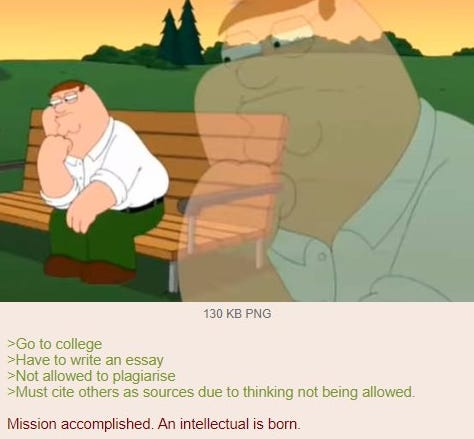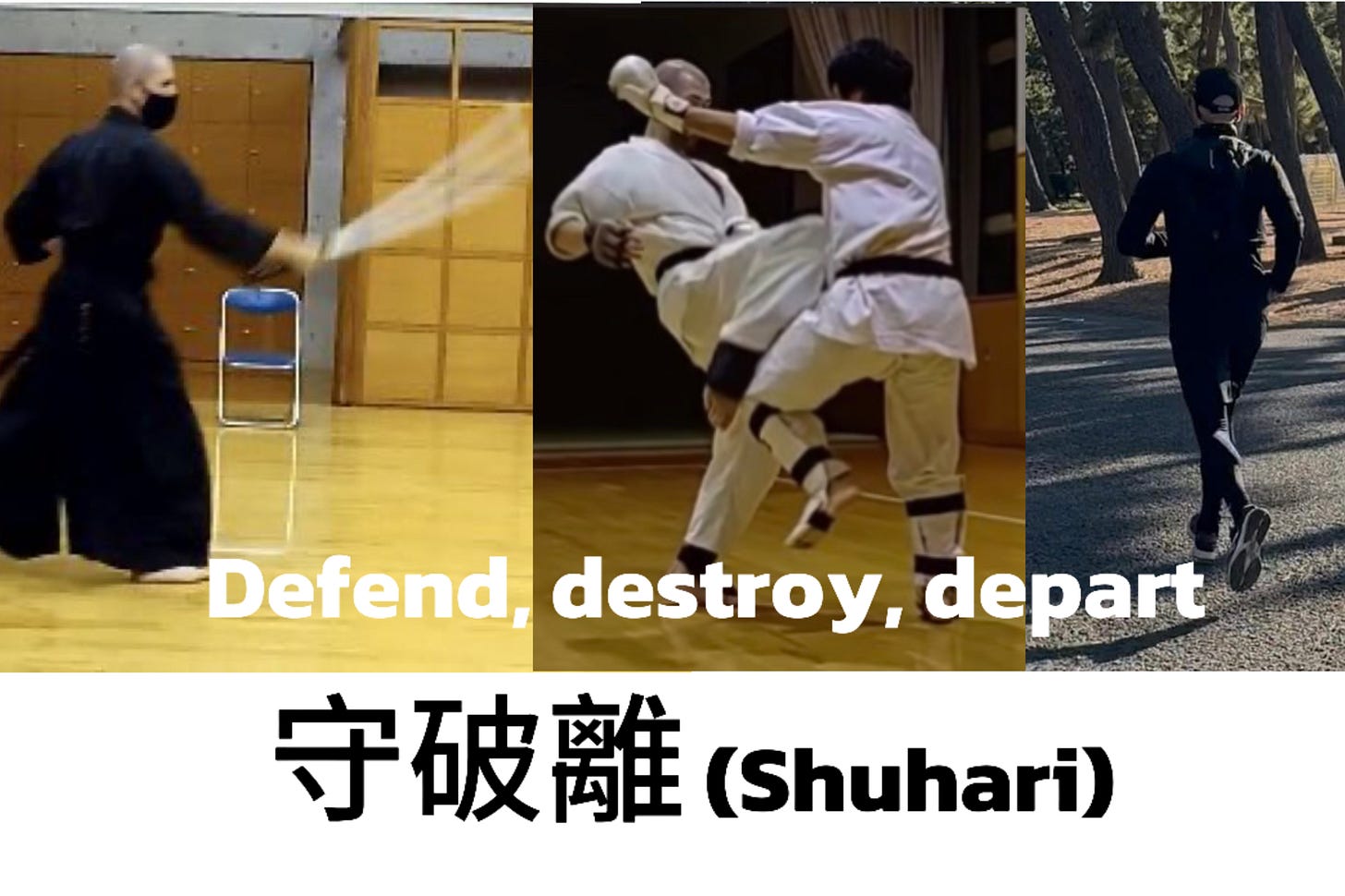守破離 (Shuhari): The process of mastery
Trust the process. Don't skip any steps
守破離 (Shuhari)…what is it?
The martial artists who read my blog may already be familiar with the term 守破離 (Shuhari). This is a term that is often used by people who are deeply into Japanese martial arts, but it is a term that can be applied to pretty much everything.
守破離 (Shuhari) is a term used to describe the three steps required to “master” a pursuit. I would translate the kanji (in this context) as:
守 (Shu): Defend
破 (Ha): Destroy
離 (Ri): Depart
This doesn’t make a lot of sense in isolation so it needs to be broken down further.
守 (Shu): Defend
When you are a beginner at something you have no choice but to follow traditional wisdom. You cannot possibly deviate from traditional wisdom without inevitably making mistakes. And they are definitely mistakes. If you are just starting out at something you can’t come up with a better way of doing it.
In the 守 (Shu): “defend” phase you need to consider traditional wisdom as something that should be strictly adhered to. Hold it close to your heart and consider the teachings as something that should be treasured, protected, and of course, defended.
破 (Ha): Destroy
When you have been following traditional wisdom for a sufficient amount of time and grasp the essence of what has been taught to you, you can start to consider its flaws. Traditional wisdom is passed down for a reason. That reason is because it works. But no human creation is perfect and there are nuances in the strengths and weaknesses of each individual, so this is when we enter the next phase.
In the 破 (Ha): “destroy” phase, you consider the flaws of traditional wisdom based on everything you have learned in the previous step. You ask questions like “Why is this done in this way?” and “Wouldn’t it be better if we did it in this way?” You experiment, you try things out, you find the true strength in traditional wisdom, and you find out where its weaknesses are.
You are no longer giving traditional wisdom the benefit of the doubt. You are testing it from every angle and trying to figure out what works and what doesn’t. You have to destroy it before you can rebuild it in your own image.
離 (Ri): Depart
Once you have followed (defended) traditional wisdom and torn it apart (destroyed) it to find its strengths and weakenesses, you have fully understood it. You know what works and what doesn’t. You have nothing more to learn from traditional wisdom and you are able to go off on your own in an enlightened way.
This is the 離 (Ri): “depart” step. The depart step doesn’t mean that you quit doing what you are doing. You just full understand the art and are at the point where you can teach people based on your experience with that art.
守破離 (Shuhari) simplified
I think shuhari is an elegant way to explain quite a complex concept. But it’s obvious to me that some people do not understand the process well, and for the benefit of those people I simplified the term:
守: Shut up and practice basics
破: Work out better ways to do things
離: Go off on your own
Of course I know that everyone who subscribes to my newsletter does not need the dumbed down version. I actually wrote this version after seeing some nonsense online (which is what inspired this post).
Don’t skip steps
Whenever I go to my iaidō dōjō, the session always starts with doing a warm up then going through the 12 制定居合道 (seitei iaidō) kata (the basic kata everyone needs to perform regardless of the style in my organization). It’s only after practicing basics that we move on to more advanced techniques (with that part of the class changing pretty much every session).
When I practice karate, the sessions always start with running through all of the 基本 (kihon : basics), before moving onto things like sparring, kata, and partner work. Almost the first half of every class is focused on basics.
The basics are the foundation on which everything else is built. You cannot skip practicing basics and only focus on doing advanced techniques. Because how can you do advanced techniques without a strong basic foundation?
I’ve had experiences where I have trained with people who want to, “run before they can walk.” These people always end up either progressing more slowly than those that trust the process, or move directly to a misunderstood 離 (ri) step thinking they have learned all that they can possibly learn.
Arrogance on display (running before you can walk)
Shuhari is not just a martial arts thing. When I was at graduate school my supervisor sometimes talked about shuhari and why it was important to listen to him because of it. (He also happened to be a kendō practitioner, but that is neither here nor there).
Shuhari applies to academic research just as much as it applies to anything else. You have to go through the steps or you’ll never ‘get it.’
Recently I saw a post on 𝕏 complaining about the necessity for citations when writing an essay.
For the benefit of people reading this with a machine translator:
Go to college
Have to write an essay
Not allowed to plagiarize
Must cite others as sources due to thinking not being allowed
Mission accomplished. An intellectual is born
An essay is not a diary. Novel ideas are also quite rare in this era of information. When you are studying a subject you need to actually read up on the subject before having original thoughts about the subject.
If I asked you to write an essay on blood types but forbid you to do any research on it then what you would probably hand me is a creative writing work based on stuff you heard throughout your life about what blood types are. However, if you were to do research on the matter you might tell me the problems that led to researching blood types, the year they were proposed, the process in which they were discovered, the problems solved by the discovery of the antigens, how blood types are used in the modern era, AND THEN your original thoughts on blood types.
To go from knowing nothing to original thoughts skips 守破 (shuha) and moves straight to 離 (ri). This is useless to everyone. I might as well ask some random person at a bus stop if I want a haphazard, uneducated opinion with zero background research. But if you follow the process by doing the background research (citing traditional wisdom) you hit the 守 (shu) stage, you may then discover problems with traditional wisdom you can discuss those problems 破 (ha), and if you eventually do some groundbreaking research to solve the problems you proposed you can go off on your own and fix the problem 離 (ri).
Of course you may not be able to complete the whole process when writing an essay during your undergraduate degree, but you are defiantly missing the point if you try to run before you can walk by rushing the process.
Endless flux
I tend to think of 守破離 (shuhari) of being in more or less endless flux. It is important to continually practice basics. When you understand the basics, it’s important to scrutinize them and consider why they are done in this way. When you fully understand, then you can depart and do things on your own. The more I practice and analyze the basics, the more I realize I need to readdress things and need to go back to the start. Maybe I missed something and need to relearn. Maybe the traditional wisdom really is nonsense and I have a better way. Maybe I’m too arrogant, missed something and need to study more.
It’s important to keep the process alive. An eternal student may never hit the 離 (ri) stage. In fact, one of the greatest teachers in my life (Kaichō Tanaka of the Yushinkai) refused to be called “sensei” because he consider it to be the death of learning. “I just lead this group. I’m sill learning.” And in a way, I think his attitude really was that of a true master.
Final thoughts and Take Home Messages
Though there may be other translations of 守破離 (shuhari), my preferred translation is as follows:
守 (Shu): Defend
破 (Ha): Destroy
離 (Ri): Depart
It’s an endless cycle of considering (defending) traditional wisdom, finding the faults in (destroying) traditional wisdom, then departing from traditional wisdom.
Shuhari is applicable to all things. It doesn’t matter if the pursuit is physical or mental. I apply this to running as much as I apply it to science. But martial artists are probably the ones that “meditate” on it the most.
Mastery is not a stage that most people will reach, and that’s ok. Walking the road and striving for perfection is enough. It is much better to be an eternal student than it is to call yourself “master” and depart from traditional wisdom without fully grasping it.
Thank you very much for reading. If you enjoy my work please share it with someone you think would also enjoy it.
If you aren’t subscribed, please sign up to keep up to date.
If social media is more your thing I’m active on Facebook, Twitter, and Instagram.
And if you are feeling generous but don’t want to commit to a monthly subscription, you can send a small donation to my Buy me a coffee page below.
Osu!
Cover image:









Glad somebody is writing about this. In the martial arts this one has been used as a validation model for many decades in the west. I always wonder about the time investment people need to put in to achieve these different levels? Some people think it happens in a few years. Personally, I think it's probably decades, and even then some people never make it past the first level and fool themselves they are on the second level or above. In high aspirational martial arts, maybe it's a theory and not a reality. I don't know.